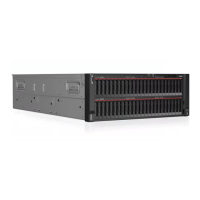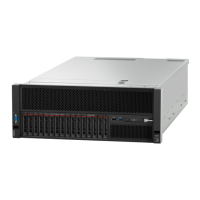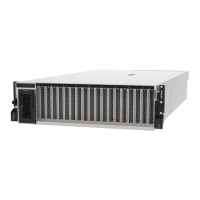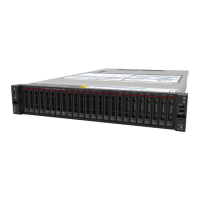Table 25. Channel and slot information of DIMMs around a processor
Slot 0 1 0 1 0 1
Processor
1 0 1 0 1 0
Channel Channel 2 Channel 1 Channel 0 Channel 0 Channel 1 Channel 2
DIMM number
(Processor 1)
1 2 3 4 5 6 7 8 9 10 11 12
DIMM number
(Processor 2)
13 14 15 16 17 18 19 20 21 22 23 24
DIMM number
(Processor 3)
25 26 27 28 29 30 31 32 33 34 35 36
DIMM number
(Processor 4)
37 38 39 40 41 42 43 44 45 46 47 48
Memory module installation guideline
• Two types of configurations are supported. Consider corresponding rules and population sequence
accordingly:
– “DRAM DIMMs installation order” on page 153 (RDIMMs or 3DS RDIMMs)
– “PMEM and DRAM DIMM installation order” on page 159
• A label on each DIMM identifies the DIMM type. This information is in the format xxxxx nRxxx PC4-
xxxxx-xx-xx-xxx. Where n indicates if the DIMM is single-rank (n=1) or dual-rank (n=2).
• At least one DIMM is required for each processor. Install at least six DIMMs per processor for good
performance.
• When you replace a DIMM, the server provides automatic DIMM enablement capability without requiring
you to use the Setup utility to enable the new DIMM manually.
Attention:
• Mixing x4 and x8 DIMMs in the same channel is allowed.
• Install DIMMs of the same speed for optimal performance. Otherwise, the BIOS will find and run the
lowest speed among all channels.
• Always populate DIMMs with the maximum number of ranks in the farthest DIMM slot, followed by the
nearest DIMM slot.
• Mixing 128 GB and 256 GB 3DS RDIMMs is not supported.
DRAM DIMMs installation order
This section contains information of how to install DRAM DIMMs properly.
Chapter 5. Server hardware setup 153

